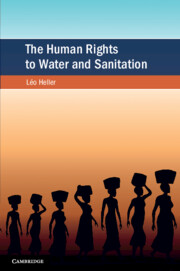Crossref Citations
This Book has been
cited by the following publications. This list is generated based on data provided by Crossref.
Nahas, Maria Inês Pedrosa
de Carvalho, Rodrigo Coelho
and
Heller, Léo
2023.
A Framework to Assess and Monitor Human Rights to Water and Sanitation at the Municipal Scale: A Study case in the Belo Horizonte Metropolitan Region.
Social Indicators Research,
Vol. 168,
Issue. 1-3,
p.
645.
Karasaki, Seigi
Goddard, Jessica J.
Cohen, Alasdair
and
Ray, Isha
2023.
Environmental justice and drinking water: A critical review of primary data studies.
WIREs Water,
Vol. 10,
Issue. 5,
Cherukumilli, Katya
Ray, Isha
and
Pickering, Amy J.
2023.
Evaluating the hidden costs of drinking water treatment technologies.
Nature Water,
Vol. 1,
Issue. 4,
p.
319.
Moreira, Fernanda Deister
Heller, Leo
and
Rezende, Sonaly
2024.
Street vendors and the human rights to water and sanitation: a scoping review.
Local Environment,
Vol. 29,
Issue. 7,
p.
902.
Jacob, Daniel Etim
Nеlson, Imaobong Ufot
and
Izah, Sylvester Chibueze
2024.
Water Crises and Sustainable Management in the Global South.
p.
487.
Castro, Marco Aurélio Soares de
Valencio, Norma
Iossifova, Deljana
Santiago, Cristine Diniz
Ziglio, Luciana
Valencio, Arthur
Pugliesi, Erica
Gonçalves, Juliano Costa
Cheung, Eric
and
Sengupta, Ulysses
2024.
An Experiment in Transdisciplinary Systems Mapping: Architecture and the Water–Energy–Sanitation Nexus in Brazil.
Architecture,
Vol. 4,
Issue. 1,
p.
73.
Valencio, Norma
Valencio, Arthur
Carvalho, Gabriel G.
and
Baptista, Murilo S.
2024.
Economic–Sanitation–Environmental (Dis)Connections in Brazil: A Trans-Scale Perspective From Minas Gerais State and BH Microregion.
Urban Planning,
Vol. 9,
Issue. ,
Dickstein, Daniel R.
Edwards, Collin R.
Rowan, Catherine R.
Avanessian, Bella
Chubak, Barbara M.
Wheldon, Christopher W.
Simoes, Priya K.
Buckstein, Michael H.
Keefer, Laurie A.
Safer, Joshua D.
Sigel, Keith
Goodman, Karyn A.
Rosser, B. R. Simon
Goldstone, Stephen E.
Wong, Serre-Yu
and
Marshall, Deborah C.
2024.
Pleasurable and problematic receptive anal intercourse and diseases of the colon, rectum and anus.
Nature Reviews Gastroenterology & Hepatology,
Vol. 21,
Issue. 6,
p.
377.



